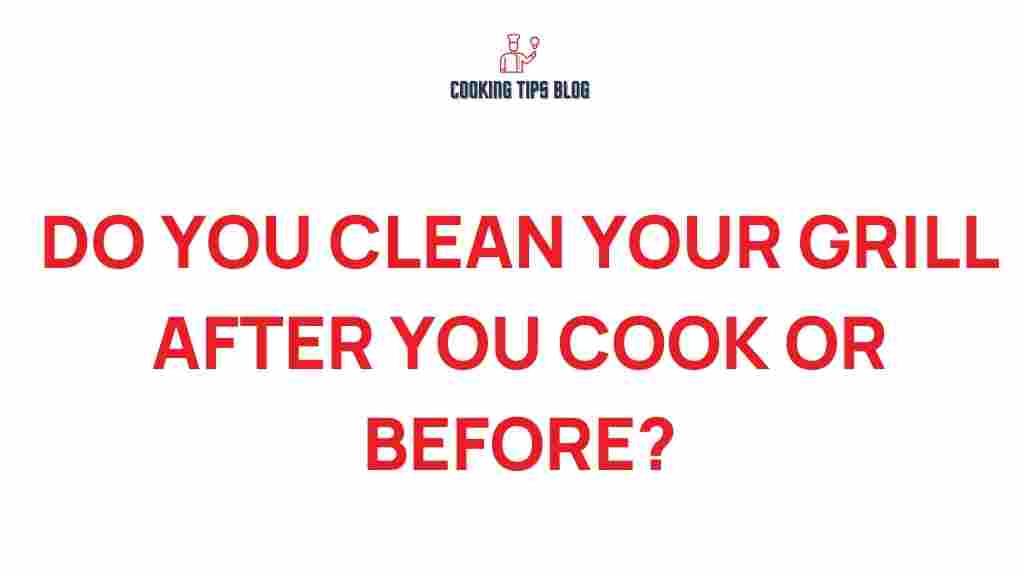The Great Grill Debate: Clean After Cooking or Before? (Grill Cleaning)
Grilling season is a cherished time for many, filled with the aroma of sizzling meats and the joy of outdoor cooking. However, one question often arises in the grilling community: when is the best time to clean your grill? Should you tackle grill cleaning before or after cooking? This article delves into the pros and cons of each approach, offers a step-by-step guide for effective cleaning, and provides troubleshooting tips to ensure your grill remains in top condition.
Understanding the Importance of Grill Cleaning
Before we dive into the debate, it’s crucial to understand why grill cleaning is essential. Regular maintenance not only prolongs the life of your grill but also enhances the flavor of your food and ensures safer cooking. Residual grease and food particles can harbor bacteria and impart unwanted flavors to your dishes. Therefore, establishing a cleaning routine is vital for both safety and taste.
Why Clean After Cooking?
Cleaning your grill after cooking has several advantages:
- Immediate Removal of Residue: Cleaning immediately after cooking prevents food from hardening on the grill grates, making it easier to remove.
- Reduced Risk of Bacteria: Cleaning after cooking minimizes the risk of bacteria growth, ensuring your grill remains sanitary.
- Better Flavor: By eliminating leftover food particles, you improve the flavor of future meals, avoiding any unpleasant burnt taste.
Why Clean Before Cooking?
On the other hand, some grill aficionados advocate for cleaning before cooking. Here are their reasons:
- Clean Cooking Surface: Starting with a clean grill ensures that no old flavors affect your new dish.
- Inspection Opportunity: Cleaning before cooking allows you to inspect your grill for any issues, such as rust or damage, that may need attention.
- Improved Heat Distribution: A clean grill can help distribute heat more evenly, providing better cooking results.
Step-by-Step Guide to Grill Cleaning
Regardless of when you decide to clean your grill, having a systematic approach will yield the best results. Here’s a step-by-step guide to effective grill cleaning:
Supplies You Will Need
- Grill brush (preferably brass or stainless steel)
- Bucket of warm, soapy water
- Sponges or cloths
- Scraper (for stubborn residue)
- Protective gloves
- Grill cleaner (optional)
Cleaning After Cooking
- Turn Off the Grill: Ensure the grill is turned off and cooled slightly. However, cleaning while it’s still warm can make residue removal easier.
- Scrape the Grates: Use a grill brush to scrape off any leftover food particles and grease from the grates.
- Wash with Soapy Water: Dip a sponge in warm, soapy water and wipe down the grates thoroughly.
- Rinse and Dry: Rinse the grates with clean water and dry them with a clean cloth.
- Inspect and Clean the Drip Tray: Remove and clean the drip tray to prevent flare-ups during future grilling.
Cleaning Before Cooking
- Preheat the Grill: Turn on the grill and let it heat up for about 15 minutes. This helps burn off any leftover debris.
- Brush the Grates: Once heated, use a grill brush to clean the grates thoroughly.
- Wipe with Soapy Water: After brushing, dip a clean sponge in soapy water and wipe down the grates.
- Rinse and Dry: Rinse the grates with clean water and dry them off.
- Prepare for Cooking: Once the grill is clean, you can proceed to preheat it for your grilling session.
Troubleshooting Common Grill Cleaning Issues
Even with a solid cleaning routine, you may encounter some challenges. Here are common issues and how to resolve them:
Stubborn Residue
If you find that residue is not coming off easily, try the following:
- Soak the grates in warm, soapy water for an hour.
- Use a scraper to gently remove the stubborn residue.
- Consider using a grill cleaner specifically designed for tough stains.
Rust on the Grill
Rust can be a grill owner’s worst nightmare. To prevent and treat rust:
- Always dry your grill after cleaning to prevent moisture build-up.
- Use a rust-resistant grill cover when the grill is not in use.
- If rust is present, scrub it off with a wire brush and apply a rust-inhibiting spray.
Difficulty Removing Grease
Grease can be particularly tricky to clean. To tackle this:
- Heat the grill to a high temperature to burn off excess grease.
- Use a combination of baking soda and vinegar to create a paste that can help break down tough grease.
- Consider using a specialized degreaser for grills if the problem persists.
Conclusion: The Best Approach to Grill Cleaning
The great grill cleaning debate—whether to clean after cooking or before—doesn’t have a one-size-fits-all answer. Both methods have their merits, and the best approach often depends on personal preference and grilling habits. Regardless of when you choose to clean, the important thing is to maintain a routine that ensures your grill remains in top shape.
By following the step-by-step guide provided, you can enjoy delicious grilled meals while keeping your grill safe and hygienic. Remember, a clean grill is a happy grill, and it will reward you with better flavor and a longer lifespan. For further tips on grill maintenance, check out this helpful resource.
Whether you decide to embrace the post-cooking cleanup or the pre-cooking polish, always prioritize grill cleaning to ensure fantastic grilling experiences. Happy grilling!
This article is in the category Tools and created by Cookingtipsblog Team
